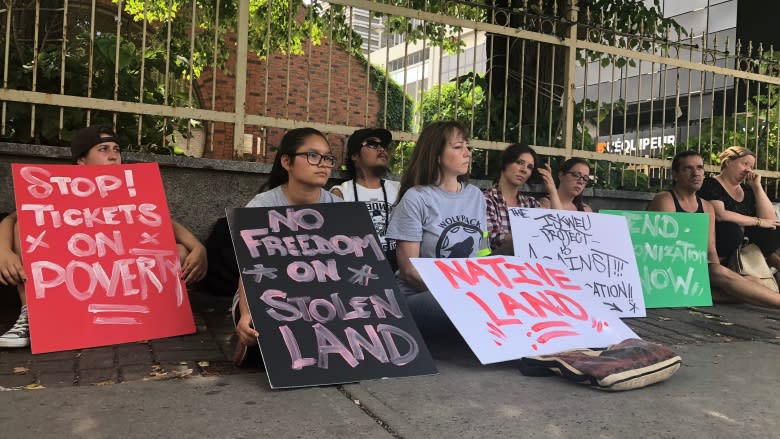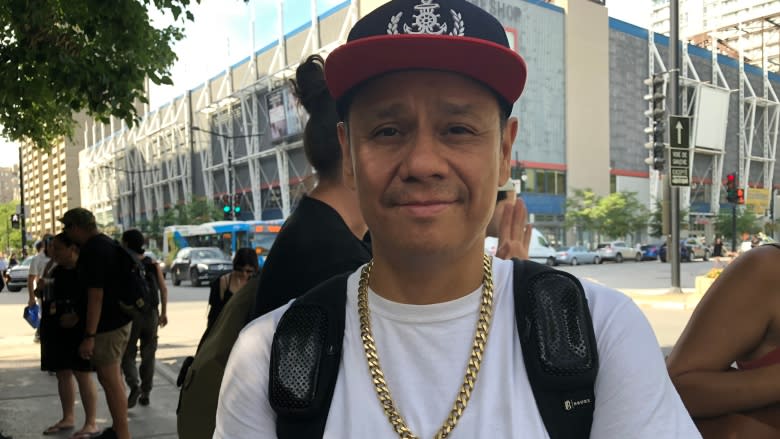Indigenous activists call for end to ticketing of homeless people in Montreal
More than a dozen people gathered in downtown Montreal Tuesday, concerned about the police ticketing homeless people around Cabot Square, which has historically been a gathering space for Indigenous people in the city.
"How many times do Indigenous people have to be displaced over and over and over again?" said Jessica Quijano, co-ordinator of the Iskweu project at the Native Women's Shelter of Montreal.
"The message we're sending today to the city of Montreal, to the police, the citizens, everyone that this is a human rights abuse. This needs to end."
The Iskweu project aims to help families of missing and murdered Indigenous women and girls, and for Quijano, ticketing adds to the vulnerability of Indigenous women living on the street.
'When I have a woman who is maybe a victim of violence and who has been sexually assaulted, she does not want to go to police because she's ticketed on a daily basis," she said.
"People are homeless and are living their life. They're doing what we do at home — they eat, they drink — and they are being shamed and stigmatised for it."
Tuesday's gathering at the corner of Ste-Catherine and Atwater was organized after outreach workers got word police would begin ticketing at the intersection as a result of pressure from business owners around the square.
Signs in English and Inuktitut were taped to a fence along the street earlier in the week to warn homeless people that frequent the square.
"My concern was if we don't put a sign up, they're going to forget," said Nakuset, the executive director of the Native Women's Shelter.
"From what I understand, there haven't been any tickets as of yet, but they told us this is the area, so it's only a matter of time. Our people have been over-ticketed to an enormous degree and it is disheartening to get these tickets. They can't pay it. It weighs on them."
The signs were removed hours later, but more were erected on Tuesday. Nakuset hopes they will stay.
"We have to at least give them the awareness of the danger [that's] here. That's all we want to do is to say that this is not safe, go somewhere else," she said.
Nakuset said the police should also have some responsibility in educating businesses in the area about issues facing the homeless population, and resources to which they can be referred.
Ticketing a 'last resort measure': police
According to a 2013 report on Cabot Square by the Montreal Urban Aboriginal Community Strategy Network, Indigenous homeless people in Montreal face higher rates of incarceration and fines for public drunkenness, drug use, possession and sleeping in public spaces.
Adalbert Pimentel, the community officer at the Montreal police's station 12 near Cabot Square, said he's received complaints from multiple merchants and their customers in the area about individuals consuming alcohol and leaving garbage around their property.
"As a police officer, it's a part of our mandate when we get a complaint that we have to act on it," said Pimentel.
"It's mostly interventions. It's hard to quantify. If I ask any police officer here, they'll tell me maybe every 10 warnings it ends up in a fine when someone refuses to co-operate or continues doing the infraction."
Pimentel said ticketing is one of their "last resort measures." Informing outreach workers of the complaints is something done "in the spirit of cohabitation."
He said in some cases the complaints are appropriate for an outreach worker to deal with, and in others it's something that only the police department can deal with, but that "it's in everybody's interests to work together to find solutions."




